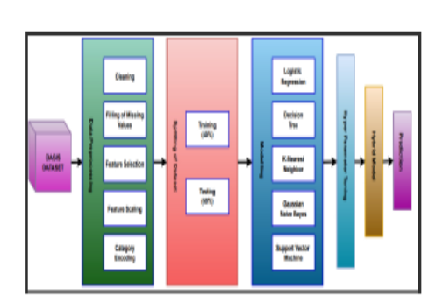


Indian Journal of Science and Technology
DOI: 10.17485/IJST/v16i32.1007
Year: 2023, Volume: 16, Issue: 32, Pages: 2518-2533
Original Article
Saima Parvez1, Swaleha Zubair2*, Afreen Khan3
1M.Sc. Student, Department of Computer Science, Aligarh Muslim University, Aligarh, India
2Associate Professor, Department of Computer Science, Aligarh Muslim University, Aligarh, India
3Assistant Professor, Department of Computer Application, Integral University, Lucknow, India
*Corresponding Author
Email: [email protected]
Received Date:29 April 2023, Accepted Date:13 July 2023, Published Date:26 August 2023
Objectives: To develop a hybrid machine learning (ML) model that predicts Alzheimer’s disease (AD) accurately. Methods : This study used the Open Access Series of Imaging Studies (OASIS) dataset to develop a hybrid ML model. Given this data, we utilized five algorithms i.e., Logistic Regression, Gaussian Naive Bayes, K Nearest Neighbor, Support Vector Machine, and Decision Tree. An ensemble technique was employed to construct an ML-based hybrid model with 343 observations, 40% of which were used for training and 60% for testing. Findings: Using the voting classifier technique, the hybrid Machine learning model obtained an accuracy of 89.28%. Following hyperparameter tuning, the model’s accuracy was increased to 90.62%. The effectiveness of AD classification was assessed using Accuracy, Precision, Recall, and F1-score. Novelty: The results demonstrate that, even with a limited amount of training data, the Hybrid ML modelling approach can reliably predict Alzheimer’s disease in real-world community settings.
Keywords: Alzheimer’s Disease; Classification; Machine Learning; OASIS; Prognosis
© 2023 Parvez et al. This is an open-access article distributed under the terms of the Creative Commons Attribution License, which permits unrestricted use, distribution, and reproduction in any medium, provided the original author and source are credited. Published By Indian Society for Education and Environment (iSee)
Subscribe now for latest articles and news.